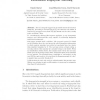Free Online Productivity Tools
i2Speak
i2Symbol
i2OCR
iTex2Img
iWeb2Print
iWeb2Shot
i2Type
iPdf2Split
iPdf2Merge
i2Bopomofo
i2Arabic
i2Style
i2Image
i2PDF
iLatex2Rtf
Sci2ools
123
click to vote
ICBA
2004
Springer
2004
Springer
Externalized Fingerprint Matching
The 9/11 tragedy triggered an increased interest in biometric passports. According to several sources [2], the electronic ID market is expected to increase by more than 50% per annum over the three coming years, excluding China. To cost-effectively address this foreseen explosion, a very inexpensive memory card (phonecard-like card) capable of performing fingerprint matching is paramount. This paper presents such a solution. The proposed protocol is based on the following idea: the card stores the user’s fingerprint information to which random minutiae were added at enrolment time (we denote this scrambled template by t). The card also stores a binary string w encoding which of the minutiae in t actually belong to the holder. When an identification session starts, the terminal reads t from the card and, based upon the incoming scanner data, determines which of the minutiae in t are genuine. The terminal forms a candidate w and sends it to the card. All the card needs to do is tes...
Biometrics | Card | ICBA 2004 | Inexpensive Memory Card | Minutiae |
Related Content
| Added | 01 Jul 2010 |
| Updated | 01 Jul 2010 |
| Type | Conference |
| Year | 2004 |
| Where | ICBA |
| Authors | Claude Barral, Jean-Sébastien Coron, David Naccache |
Comments (0)

